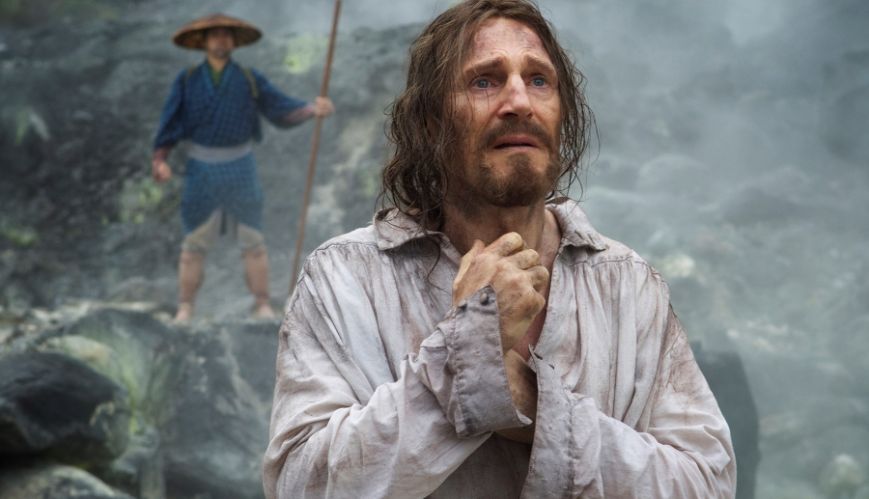Silence

Silence
21 March 2017
Liam Neeson plays Father Cristóvão Ferreira, a Portuguese Jesuit in Japan, who is tortured for his faith. Photo: Kerry Brown.
There are many comforting forms of silence. The cool silence of the dawn; the warm silence between friends. There is one silence, though – one absence – that scares some and elicits anger in others. It is the silence attributed to God.
Specifically, the absence of comfort in the face of suffering. Christians have written about this particular silence since pen met paper.
Now Hollywood is set to put the question. Martin Scorsese’s Silence is based on the award-winning book by Japanese author Shūsaku Endō.
It opens some 10 years after Christianity has been outlawed in 17th-century Japan. Roman Catholic missionaries have been tortured to death, and local converts forced to deny their faith. Rodrigues, a young Jesuit priest, is sent to investigate, accompanied by Father Garrpe. Their joint mission is to give comfort to whatever surviving Christians they can find.
The believers Rodrigues (Andrew Garfield) and Garrpe (Adam Driver) discover are mostly fervent and thankful to God for sending the young priests. Yet suspicions circle around their Japanese guide, Kichijiro (Yôsuke Kubozuka), who has already denied his faith once before.
When the Christianity community is betrayed, Rodrigues and Garrpe witness how determined the local believers are, even in the face of prolonged torture. Yet the question constantly arises, where is God in all of this?
Silence is without doubt one of the most provocative Christian films ever to be produced by a non-Christian Hollywood. Take, for example, the pressure to remain silent in the face of persecution. If the Japanese faithful are prepared to trample on the crudely carved images of Christ presented by their inquisitors they will be set free.
Rodrigues and Garrpe come to loggerheads over what to tell the believers. Rodrigues encourages them to “Trample!” – the images are, after all, nothing more than religious emblems. However, Garrpe realises they represent much more to these fledgling believers and he is not about to cause them to stumble.
Modern audiences will be tempted to side with Rodrigues, yet the Bible remains starkly clear on the importance of public confession, even in the face of persecution. The Apostle Paul was very familiar with suffering, and in his letter to the persecuted church at Rome he goes so far as to tie our declaration as believers to our very salvation: “If you declare with your mouth, ‘Jesus is Lord’, and believe in your heart that God raised him from the dead, you will be saved” (Romans 10:9).
And is God really silent in the face of suffering? Again, secular viewers might conclude Christianity is a faith hardly worth valuing if it must spend the lives of its supporters to prove that value.
Yet the very Jesus that Paul wrote about, is God’s answer to the accusation he sits idly by. Rodrigues comes to understand that Jesus not only suffered on his behalf, but is present with him in his doubt: “When you suffer, I suffer with you. To the end, I am close to you.”
Silence seems to finish suggesting personal belief, not public profession, is the most important thing. Yet Jesus makes it clear no one can expect to deny him and still reach the Father.
Which leads me to wonder what God might say to the wretched Kichijiro? Kichijiro is a constant failure, but he is also constantly aware of what he needs from God. Jesus may disown those who ultimately disown him, but Kichijiro’s role in Silence reminds me strongly of a trustworthy saying that should give hope to all who struggle to follow Christ: “If we are faithless, he remains faithful, for he cannot disown himself ” (2 Timothy 2:13).
Mark Hadley is the culture writer for Others and is one of Australia’s leading Christian communicators.
Watch an interview with Martin Scorsese, produced by Fuller Studios, about his making of the film.
Read how to support modern day Christians around the world suffering persecution for their Christian faith.